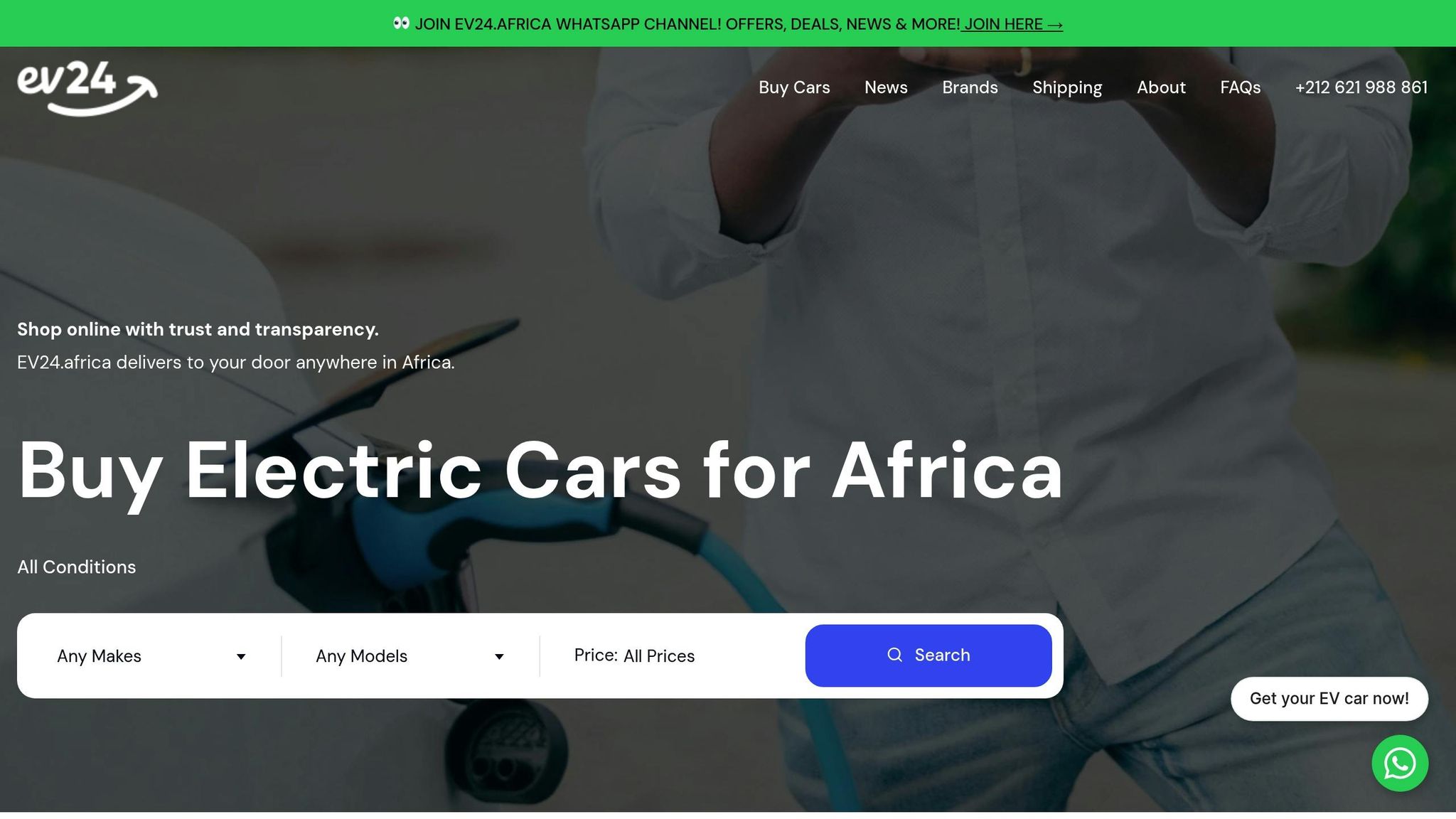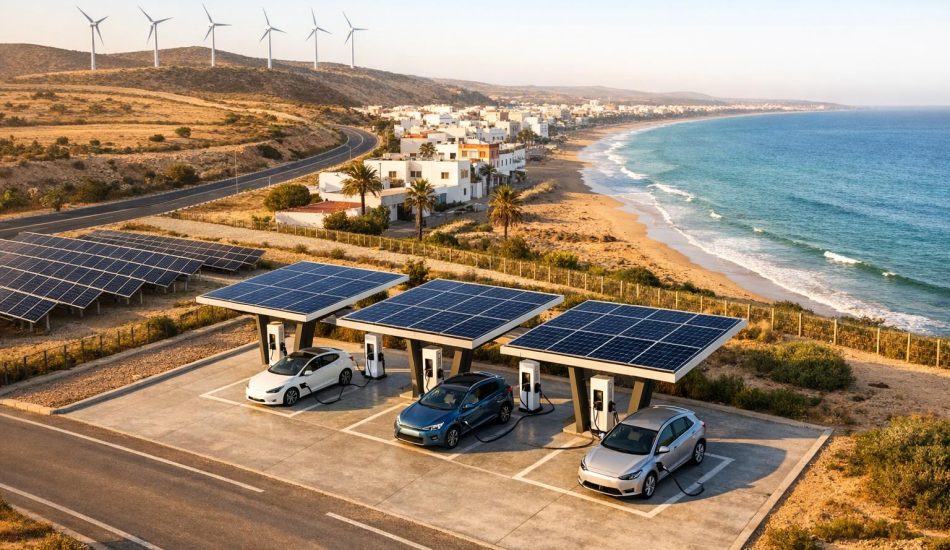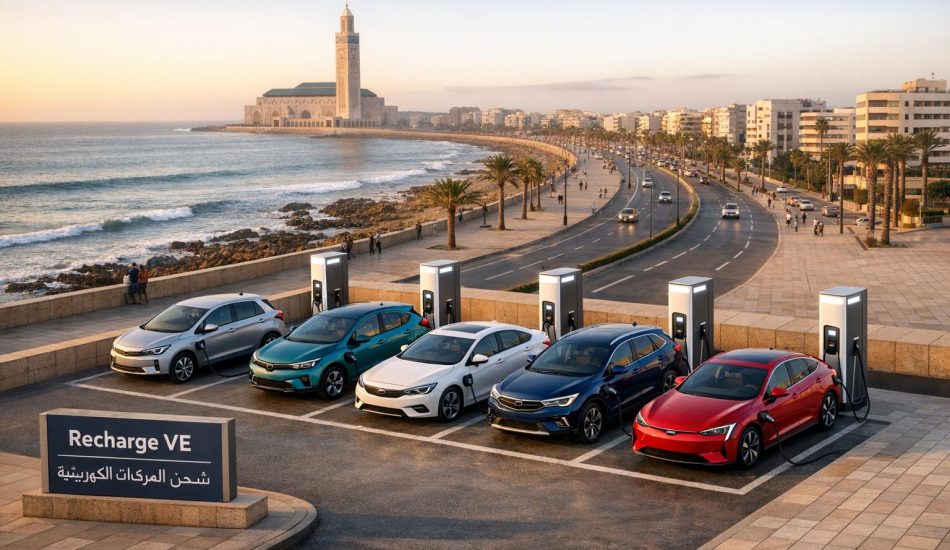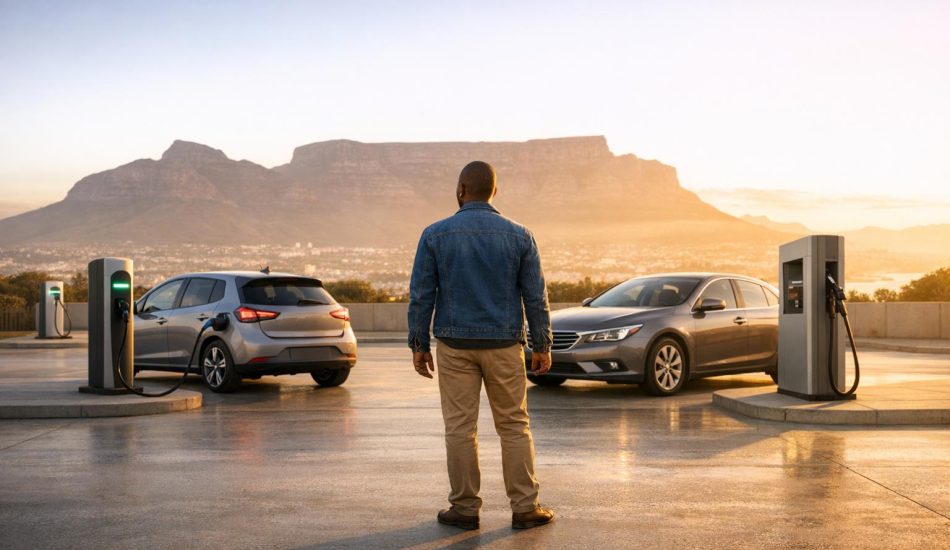
Electric cars are gaining traction in Zimbabwe due to rising fuel costs, clean energy potential, and government incentives. Import tax reductions, solar power adoption, and expanding charging infrastructure are driving interest, particularly in urban areas like Harare and Bulawayo. Options range from affordable used models like the Geely Panda Mini Base ($5,880) to high-end choices like the ZEEKR 009 ($85,000). Buyers can explore platforms like EV24.africa for seamless imports or local shops for in-person purchases. With reduced taxes and solar charging solutions, EVs present a cost-effective, eco-friendly alternative to traditional vehicles.
Electric Cars in Zimbabwe
Zimbabwe sees more people buying electric cars (EVs), driven by government acts to cut back on fuel needs from other places and push for cleaner energy.
Government Acts and Tax Cuts
On January 1, 2025, Zimbabwe cut down car import taxes on EVs from 40% to 25%. This drop, plus a 15% VAT, puts EVs like the 2017 Nissan LEAF – costing just over $11,000 in Japan – in line with older gas cars in price. Now, even used Teslas might attract buyers who used to look at old BMW or Mercedes cars.
This drop in tax is to deal with the high cost of fuel imports, which hit $1.58 billion in 2023 and was meant to grow to $1.62 billion in 2024. Since Zimbabwe buys all its gas and diesel from outside, more people using EVs could really help save money. The push for cleaner energy is in line with this move, as about 95% of cars bought each year are used ones.
Charge Points and Power Supply
More EV charge spots are showing up, mostly in big cities in Zimbabwe. But, power supply issues are big. With power plants old and rain low, capacity fell from 1,050 MW to just 125 MW at the Kariba Dam, causing big power cuts.
This has forced Zimbabwe to buy pricey power from outside, costing $180 million in 2023, and expected to be $220 million in 2024. To tackle this, many EV owners now use solar power to charge their cars. The solar field is growing, like with the new 25 MWp solar plant near Harare by Centragrid, now the second-biggest solar power site added to the grid. Funnily enough, the money spent yearly on buying power could put up ten more solar plants like this in less than a year.
To help more, the government started giving money back for setting up charge stations in December 2024, to help build more.
These steps show the need for tough energy fixes, a point linked to wider talk on economy and market impacts coming next.
Hurdles and Chances for Growth
While new policies and building more charge spots look good, some big hurdles still slow down EV use. In 2023, car imports cost Zimbabwe $664 million, with $514 million spent just between January and September 2024. With fuel costs added, over 25% of the nation’s import bill is for cars and their running costs.
Bad roads in the country and often no power make it hard for people who use only the main power grid to start using electric cars (EVs). Yet, the high price of getting fuel from other places makes EVs a good pick, helping to save money for both people and the country. Zimbabwe has a lot of sun power, giving a clear way to not need other sources so much, with solar panels on roofs and stored power giving steady power for EVs.
The money gains go past just saving cash. By cutting down on fuel and cars from other lands, Zimbabwe could make its trade numbers better and keep more foreign money. Also, the green pluses match with the world’s goals for clean energy, maybe bringing money from outside. With help from the government, cheap used EVs from places like Japan, and more sun power use, Zimbabwe is building up for more people to use EVs. As the setups and solar fixes keep getting bigger, EVs will soon be a big part of how people get around.
Electric Car Costs and Types in Zimbabwe (2025)
Zimbabwe’s electric car scene is on the rise, with both cheap used cars and pricey new ones. This mix suits many budgets and tastes, helping shoppers find the right fit.
How Much Electric Cars Cost
Electric cars in Zimbabwe are mainly in four groups: entry-level, mid-range, premium, and ultra-luxury. Prices change due to the car’s age, shape, and features. Local car shops update prices often, so talk to them to get the latest.
Top Models in Zimbabwe
Some electric cars are loved for being solid, easy to keep up, and good value. When looking at an electric car, think about battery life, how far it goes, and how to charge it. Always ask local sellers for new info to make sure you choose well.
New vs. Used Electric Cars
A big choice for buyers is picking a new or used electric car. Used cars cost less at first, but check the battery’s condition well. New cars have the latest stuff and guarantees but are pricier and might take longer to get. What you pick depends on your money, how you drive, and plans for the future.
How to Buy Electric Cars in Zimbabwe
When you want to buy an electric car in Zimbabwe, you can look both on the web and at car stores. This mix of online and face-to-face ways shows that more people in the country are getting into electric cars.
EV24.africa: Web Market

EV24.africa helps you buy electric cars in Zimbabwe in a simple way. This site has a lot of new and used electric cars from big names like Tesla, BYD, Volkswagen, XPeng, Leapmotor, Changan, Wuling, Mercedes-Benz, Citroën, and Peugeot.
"At EV24.africa, we simplify the process of importing and buying electric vehicles in Africa. Our expertise ensures a seamless, transparent, and stress-free experience, so you can focus on driving the future of mobility."
EV24.africa stands out with its large stock, fitting many wallets. For example, you can buy the simple GEELY PANDA MINI BASE for $5,880, or the high-end ZEEKR 009 for $85,000.
What really makes EV24.africa different are its full import services. They take care of everything from customs to local sign-ups, offering both Roll-on/Roll-off and box ship methods. You can choose from port-to-port or home delivery, which makes things easy and fits the needs of people in Zimbabwe.
Local Sellers and Import Paths
In Zimbabwe, many electric cars are brought in by local sellers and buyers, mostly from big markets like Japan and the UK. These sellers are key in making cars cheaper, as new cars are too much for many people in Zimbabwe because of low pay and few loan choices.
For instance, Autocraft Japan has over 520 electric cars for Zimbabwe, showing that Japanese cars are a liked and cheap option.
Another choice is SAVEMARI, a shop in Harare. SAVEMARI has electric and half-gas cars, with new imports like the Honda Vezel Hybrid (auto, full tax paid) at $13,300. Local shops like SAVEMARI let you check cars in person and get them fast, but they may have fewer cars than online sites.
Also, Zimbabwe’s rulers brought in Japanese electric cars to get more people to use them, giving sellers more chances to grow their stock.
How to Buy from EV24.africa
Buying an electric car from EV24.africa is easy and clear, a new way from old local shops. With know-how in selling cars in all 54 African places, the site knows what Zimbabwe needs.
Start by looking at their list, which has full car details and clear prices. You can then pick from payment ways that fit your money needs. Ship choices include both RoRo and box ways, with port-to-home choices. EV24.africa also handles customs and local sign-ups, making your move to car owning smooth.
The site is supported by AUTO24.africa and Africar Group Pty Ltd., adding trust and money surety – big things when buying a big item like a car online.
sbb-itb-99e19e3
Money Help and Perks for Electric Cars
Paying for an electric car (EV) in Zimbabwe can be hard because many people earn little and there aren’t many payment choices. Yet, private groups and the government are doing things to help, like EV24.africa’s easy pay plans and other government steps to make EVs easy to buy.
Ways to Pay for Cars
Usual loans for EVs often have high rates and strict rules, which many buyers don’t like. EV24.africa, on the other hand, has clear prices and easy pay plans without extra hidden fees. Buyers can ask EV24.africa for more info about these choices. Also, some car shops might have loans, but these often need a big first payment, which might stop some people.
Help from the Government
The government of Zimbabwe is trying to get more people to use EVs, mainly by cutting taxes. For example, import taxes on EVs are at 25%, while it’s 40% for cars that use gas. Both types of cars have a 15% VAT, but EVs don’t have an extra old car tax.
These tax cuts can save a lot of money, whether you’re buying a cheap model or a fancy electric car. Also, the government supports using solar power to charge EVs by helping with solar systems setup. This can help keep down the high costs of electricity, making it cheaper to own an EV in the long run.
How Perks Affect Owning Costs
Government perks are big in cutting the total cost of owning an EV. Lower import taxes make the first buy cheaper, and no extra taxes on used EVs make them more attractive compared to gas cars.
| Charge Part | EV (2025) | Car with Gas |
|---|---|---|
| Customs Fee | 25% | 40% |
| Added Tax | 15% | 15% |
| Extra Fee (for old cars, 5+ years) | 0% | 25% |
Apart from tax cuts, EVs need less upkeep and have steady energy costs unlike cars that use gas. Even though the first cost can be high, more help from the government and simple ways to pay are slowly making EVs a doable option for many in Zimbabwe. The cuts in taxes and energy costs bring down the full cost of having an EV, making it a more real choice for people in the country.
Things to Think About When Getting an Electric Car in Zimbabwe
When you pick an electric car in Zimbabwe, you must think about how things like roads and weather there can change how well the car works and how you take care of it over time.
Roads and Weather There
Car makers now make electric car (EV) types thinking about Zimbabwe’s own ground and how people drive there. This move to fit EV tech to what’s there shows the hard bits about roads and power in that place. By looking at these bits, these made-for-the-job cars plan to serve Zimbabwean drivers better.
Making the Transition to Electric Mobility
Switching to electric vehicles (EVs) in Zimbabwe is becoming more accessible, with options ranging from budget-friendly to high-end models. For instance, the Geely Panda Mini Base starts at just $5,880, while premium choices like the ZEEKR 009 can cost up to $85,000.
EV24.africa has made the transition smoother by eliminating the usual hurdles of importing and registering EVs. They manage the entire process – from helping you pick the right vehicle to delivering it to your doorstep. This leaves you free to focus on selecting a car that matches your lifestyle and driving needs.
For urban drivers, affordable models like the BYD Dolphin Active, offering a 340 km range for $11,800, are great choices. If you need a longer range, the BYD Song Plus EV delivers up to 505 km for $18,680. Even pre-owned options, such as the 2025 Nissan Leaf priced at $14,950, provide a solid 240 km range.
Financing can still pose challenges, but EV24.africa offers flexible and transparent payment plans to make the transition easier.
To get started, browse EV24.africa’s lineup of trusted brands like Tesla, BYD, and Volkswagen. Their expert team takes care of the import and registration process, while their door-to-door delivery service ensures you won’t have to juggle multiple vendors or government agencies.
With growing government incentives for EV imports and an expanding network of charging stations in major cities, Zimbabweans can confidently make the shift to electric mobility. EV24.africa’s streamlined services ensure a hassle-free experience from start to finish.
FAQs
What are the key advantages of owning an electric vehicle in Zimbabwe, given the current infrastructure and energy situation?
Switching to an electric vehicle (EV) in Zimbabwe comes with some compelling perks, even in the face of current energy and infrastructure challenges. One standout benefit is the lower cost of operation. EVs are designed to be more energy-efficient and have fewer moving parts, which means they need less maintenance compared to traditional gas-powered cars.
On top of that, the government is stepping in to make EVs more affordable. Starting in 2025, import duties on EVs will drop from 40% to 25%, significantly cutting the initial purchase price. When you combine these incentives with the long-term savings on fuel and maintenance, EVs become a smart financial choice for many drivers in Zimbabwe.
How do electric car ownership costs in Zimbabwe compare to gas-powered vehicles when considering government incentives and energy savings?
In 2025, owning an electric car in Zimbabwe could actually save you money compared to sticking with a gas-powered vehicle. Why? It comes down to government incentives and lower energy costs. The government offers perks like reduced import duties and tax breaks, which can help bring down the initial cost of buying an electric car. On top of that, electricity typically costs less than gasoline, so your day-to-day fuel expenses shrink.
Even though the upfront price of an electric car is often higher than that of a traditional vehicle, the long-term savings can make it worth it. With fewer moving parts, electric motors are simpler and require less maintenance, cutting down on repair bills. For many drivers in Zimbabwe, this combination of benefits makes EVs a smart financial choice over time.
What factors should buyers in Zimbabwe consider when deciding between a new or used electric car, especially regarding battery performance and charging options?
When choosing between a new or used electric car in Zimbabwe, there are a few key factors to keep in mind – battery performance and charging options top the list. New electric vehicles (EVs) often come equipped with modern batteries that deliver longer driving ranges and support faster charging speeds. On the other hand, used EVs might have older batteries with diminished capacity, which could mean shorter ranges and longer charging times.
It’s also crucial to think about the charging infrastructure in your area. Make sure the vehicle you’re considering is compatible with local charging stations. For used EVs, take the extra step of reviewing the battery’s condition and maintenance history to avoid surprises down the road. Both new and used EVs come with their own advantages, so take the time to assess what matters most to you before making a decision.




